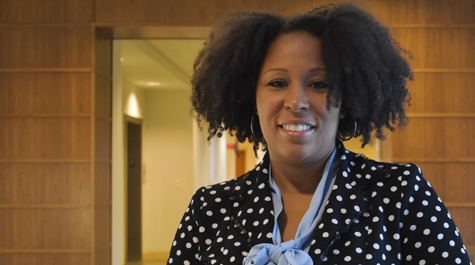New fellowship to support research in social justice and diversity
A new fellowship program at the W&M School of Education aims to address a critical scholarship gap in higher education. Studies have shown that student research projects in the areas of social justice and diversity are published in lower-impact journals or not published at all, in part due to underdeveloped methodological processes.
Natoya Haskins, assistant professor of counselor education, has seen this gap up close. Having spent the past eight years examining the lived experiences of students of color and researching culturally responsive counseling and counselor education practices, she’s worked with many students pursuing research in the areas of social justice and diversity. “This type of research continues to be overlooked or discounted, leaving students feeling isolated and potentially unprepared for future opportunities."
Arriving on the faculty at William & Mary this past fall, Haskins has quickly set out to make sure students here have the resources and support to pursue rigorous research in these critical areas. Haskins notes, “We have to show that this type of research is important and valued.” She continues, "Not only can this research illuminate injustices in our communities, it gives researchers a vehicle to challenge constructs and institutions that perpetuate inequities and marginalization.”
The fellowship, launching this spring, is open to any master’s or doctoral student at William & Mary pursuing research in the areas of social justice and diversity. Haskins hopes the cross-disciplinary nature of the program will promote collaborations and create a space where exciting new projects can be born.
The fellowship is designed to support students as they learn practical, rigorous research skills, bolster their writing, and gain exposure to the submission and editorial processes essential to being productive researchers. Funding will also be available to help students attend conferences to present their research.
For Haskins, the fellowship is a way for students to develop their emerging scholar identity and gain essential knowledge and confidence in their roles as researchers. “My hope is that fellows will learn the methodological rigor and research integrity necessary to create new knowledge — knowledge that has the potential to uplift marginalized identities and challenge oppression.”
Funding for the initiative is being provided by the School of Education, the School Psychology and Counselor Education program and the Office of Diversity and Inclusion.
“This fellowship will foster two of the values that are at the very core of what we do at the School of Education: the pursuit of influential research and a commitment to cultural competence and diversity,” says the school’s dean, Spencer Niles. “We’re preparing our students to ask the important questions and to lead conversations about the future of education.” He adds, “We’re excited to see where their questions will lead this new group of research fellows."
The application deadline for the 2017 Social Justice and Diversity Graduate Research Fellows program is February 15, 2017. Learn more and apply online.
